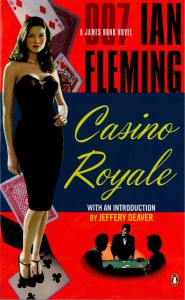I read this book on a whim months after seeing and being satisfied with the movie Spectre. I was on a James Bond kick at that point, even buying the Barbour jacket from Skyfall in anticipation for the movie. With the movie over, and my thirst unquenched, I sought the other half of the Bond universe to satisfy it. After reading the first book in the long series, I can truly say that I now know the other half of James Bond. This story is not the kind that could easily be made into a movie. There’s plenty of suspense, plenty of action, and a fair bit of romance. However the tension manifests itself mainly in the telling of the final card game, which, absent Ian Fleming’s talent for storytelling, would appear tedious on the screen; the action is definitely intense, but includes a torture scene that, if translated literally, would turn off many viewers. Furthermore without the reader’s insights into the mind of Bond, a literal translation might easily cause the romance to appear as dry and just there for kicks. The movie is essentially a watered down version of the book, adjusted to appeal to crowds of people. Ian Fleming did not share these intentions. The movies do a good job of bringing the anti-hero to the people, but the books reveal a darker and more sophisticated side of Bond. He is witty (although never outstandingly intelligent), brave, and masculine. We knew all of that from the movies. The books are where the other side of Bond really pokes through all the facade of glamour. While he is a good man at heart, he is also a blunt instrument. Bond is reckless, physical, chauvinistic, sometimes emotionally cold and bitter, and has a serious problems with alcohol, smoking, and gambling. In other words, he is human. It is these flaws, only evident after reading the books that make James Bond such an intriguing character to read.
The book itself is no literary masterpiece. It is an adventure, not a drama. The descriptions, while vivid, sometimes seem to overwhelm the pages, and the dialogue occasionally tends to drag on. There are only five central characters. There is no real theme, just a story. The whole book happens in the course of a few days. In other words, Ian Fleming is no Leo Tolstoy. But that is kind of the point. The purpose here is not to awe the reader with literary talent, but rather to entertain. The book is an escape from reality, into the world of danger and intrigue, with fast cars, evil villains, and pretty women. The book is divided into three parts. In trying to cut out the spoilers, I won’t go further than saying that the main plot is over by part two, and part three is there to further establish the character of James Bond and set up future novels. While sometimes the style of the author is a bit too journalistic, it is also Fleming’s first book. His style is much more refined in later books, really solidifying in the novel From Russia With Love. With all this in mind, this book distinguishes itself from the rest of the franchise by having Bond sit down, understand the line of moral ambiguity in which he operates, and really contemplate his life and his role as a spy pages after the climax. Obviously, he not only realizes that he is going to continue on his current path, but throws himself wholeheartedly into it. The rest of the books have action to boot and speed on like a freight train, but no other book dives into the morality of life as a secret agent like this one. It is not necessary to present any further self exploration by Bond—the knight doesn’t bother wondering whether or not he should slay the beast, he just does. While the rest of the series is more a fairytale of super villains, super plots, secret organizations all stopped by one man, this is Bond at his most raw and vulnerable, and for that alone, it is worth the read.
You would read this book to see the beginnings of James Bond; to understand why he has the license to kill, why he is so cold, and where the character begins to blossom. Bond is not yet the invincible super spy that he later becomes. He doesn’t drive an Aston Martin (instead a Bentley 4.5 liter which is still a magnificent car in its own right, fetching close to a million dollars today), he uses a Browning .22 instead of his signature Walther PPK, and he gets hurt, a lot. In Casino Royale, James Bond goes through a crash course on learning how to be a spy for MI6. He sees people that he cares about die, and you feel the emotion. This book, more than any spy book in recent memory, allowed me to relate to the main character. And that is saying a lot considering the scale to which the epic series later builds.


Be the first to comment on "The Dark Side of Bond"